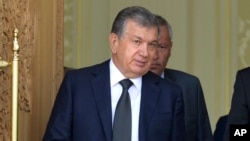Uzbekistan's parliament on Thursday appointed the country's prime minister to be the new acting president, replacing Islam Karimov, the longtime authoritarian head of state, who died of a stroke recently at the age of 78.
An exiled Uzbek opposition leader immediately denounced the move as unconstitutional.
Shavkat Mirziyoyev, who served as Karimov's prime minister since 2003, was appointed in a joint session of the upper and lower houses of parliament, making him the favorite to win Uzbekistan's next presidential election, set to take place within the next three months.
Muhammad Salih, leader of the banned Erk (Freedom) Democratic Party, who has been living in exile in Istanbul, Turkey for more than a decade, told Russia's privately-owned TV Rain on Thursday that the Uzbek parliament's move was a "gross violation of the constitution" and a "silent coup" carried out for "the usurpation of power."
According to Article 96 of Uzbekistan's constitution, the chairman of the upper chamber of parliament, Nigmatilla Yuldashev, should have been named the new acting president, but he declined, TV Rain reported.
The television channel quoted Salih as saying Yuldashev may have been pressured or even blackmailed to refuse accepting the post of acting president.
Dannil Kislov, chief editor of Fergana, an independent Uzbek information agency, told TV Rain that the parliament's decision was a shock for local Uzbek officials and observers in the capital, Tashkent, who were certain Yuldashev would become the new acting president. Kislov said that under Uzbek law, Yuldashev was required to accept the appointment.




